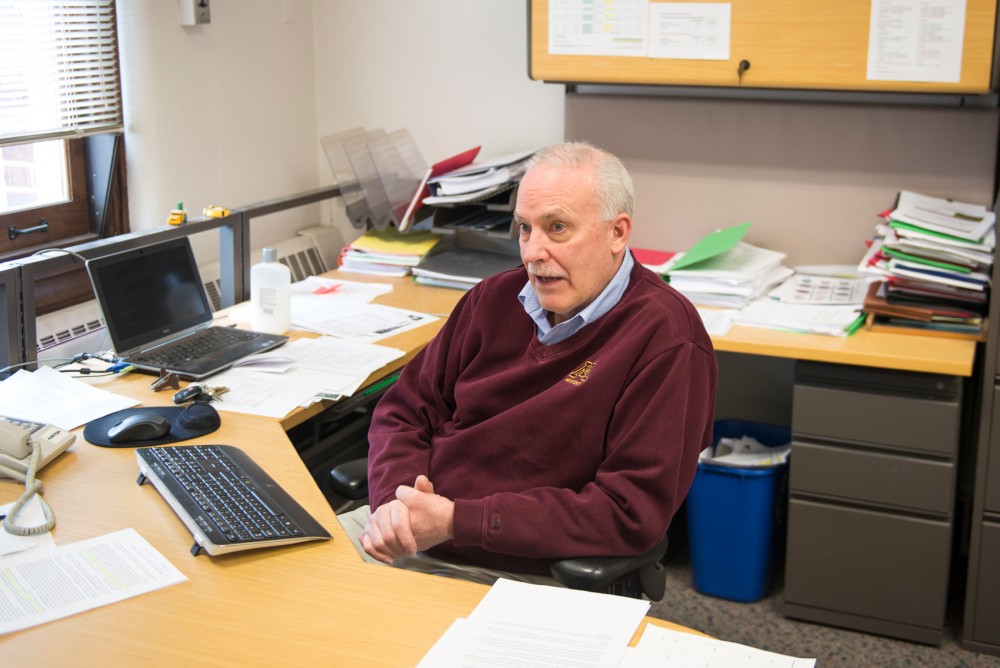For the past four decades, public service has been Richard Pfutzenreuter’s life.
Pfutzenreuter, better known as Fitz by his peers, announced in February that he plans to retire this summer after almost a quarter-century at the University of Minnesota, where he’s held a number of titles.
As the school’s current chief financial officer and vice president, he is responsible for short- and long-term financial planning, fiscal analysis and oversight of the University’s financing, among other duties.
Ironically, the University’s top financial administrator described his math skills as “adequate” and recalled needing extra help with high school algebra. Pfutzenreuter graduated from Hamline University in St. Paul, where he majored in philosophy.
Before he started at the University 24 years ago, he got his start in the public sector, working for the state’s highway department before it was folded into the Minnesota Department of Transportation. He was later a fiscal analyst for the Minnesota House of Representatives.
Many of these jobs, he said, he took serendipitously despite having ambitions to go to law school after college.
“I think it’s safe to say that that job [at the highway department] was the only job I actually, in some sense, had to apply for,” Pfutzenreuter said. “Everything else in my career has just sort of happened.”
Since then, he’s crafted strategies to finance major projects — like digging into his resources and connections with lawmakers and donors to fund the $288 million TCF Bank Stadium and the $300 million Biomedical Discovery District.
“These are legacy projects that will last for decades,” said former University President Robert Bruininks, who served from 2002 to 2011. “Without that investment, the University would be way behind the curve.”
Pfutzenreuter’s ability to connect with lawmakers and private entities, as well as various University staff and faculty, helped the school fund and accomplish projects like the stadium, Bruininks said.
Pfutzenreuter has also been charged with balancing the school’s multibillion-dollar budget amid state funding cutbacks and frequent scrutiny from state legislators.
He said he’s enjoyed the variety of his work throughout his tenure, which has ranged from financial planning the University’s marching band and Medical School to helping out with projects on the Duluth campus.
“I’ve always been able to thrive in multiple stressful situations,” he said. “What’s great about this job … is the diversity of issues and the opportunity to make a difference.”
In 2010, the Minneapolis/St. Paul Business Journal named Pfutzenreuter CFO of the year.
A demanding career
Before students pour into campus every morning, Pfutzenreuter typically arrives to his office on the third floor of Morrill Hall at about 7 a.m.Often, he doesn’t leave for home until early evening.
His assistant, Jessie Strader, said most days, his schedule is packed and filled with back-to-back appointments nearly every hour.
Strader said she has the same response any time someone calls when Pfutzenreuter is running late to a meeting.
“I just book him. I don’t ship him,” she says.
To decompress, Pfutzenreuter said he spends time at his cabin and enjoys other outdoor activities like fishing and hunting.
Though he approves a number of University projects for funding, he often is forced to say no when the money isn’t there, said Julie Tonneson, the school’s associate vice president for budget and finance.
“If he tells you something, it’s true, and it’s going to stay true,” University President Eric Kaler said. “He’ll be very hard to replace.”
Trying times
During years in which the state decreased funding for the University, Pfutzenreuter said he would often highlight the impact cuts would have on smaller departments and units.
Bruininks said Pfutzenreuter would come into his office with concerns about the impacts budget reductions would have on academic units and departments that lacked the means to absorb a financial hit.
“I appreciated the fact that he cared about the entire University and not just balancing the books,” Bruininks said.
One of the more stressful periods of Pfutzenreuter’s tenure, Tonneson said, was in 2012 after a Wall Street Journal article highlighted excessive administrative costs at the University.
While the school claimed a number of points the story made were misleading, it launched initiatives to cut $90 million administrative costs by 2019 amid the story’s backlash.
“He spent a lot of time with that [Wall Street Journal] reporter,” Tonneson said. “I think Fitz took it personally because he really values transparency.”
The future
The decision to retire was difficult, Pfutzenreuter said. He was diagnosed with prostate cancer last spring, and he said he anticipates another round of treatment.
Though prostate cancer is highly treatable, Pfutzenreuter said it played a role in his decision to leave.
“I think that made me pause and ask, ‘How much time do you get?’ ” he said as he looked across his office at photos of his family. “It makes you stop and think after 40 years.”
John Frobenius, a former member of the Board of Regents from 2003 to 2015 who chaired the board’s finance committee, said he hopes Pfutzenreuter spends his retirement working on projects around his cabin.
“He’s definitely earned it,” he said.
While some of Pfutzenreuter’s peers, such as Regent Patricia Simmons, speculate that he may make a return to a volunteer position at the University, he said he doesn’t have any immediate plans.
“There’ll be lots of opportunities to donate my time,” Pfutzenreuter said. “If the University wants me to help, I’m just a phone call away.”
Kaler announced in February that Pfutzenreuter’s position would be consolidated into two positions and said he hopes to have the roles filled in July.
“He’s really been terrific and fun to work with,” Kaler said. “He’ll be missed.”


